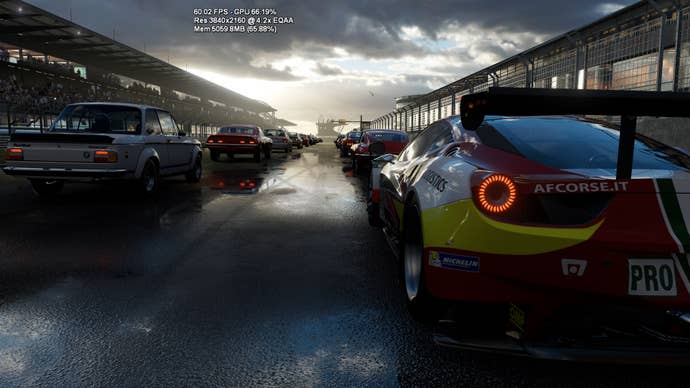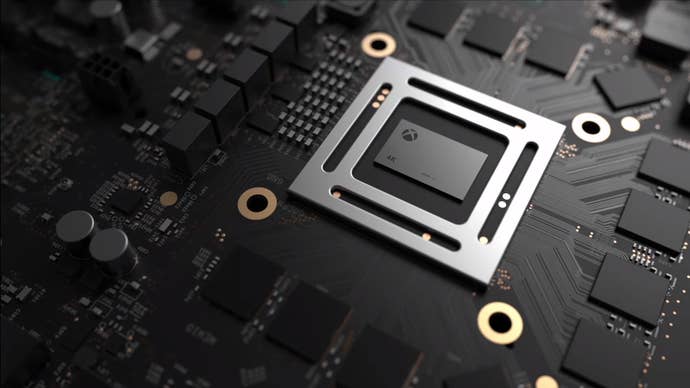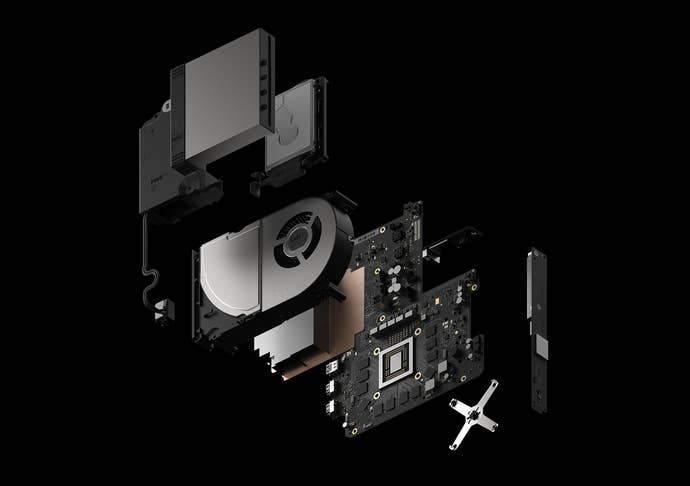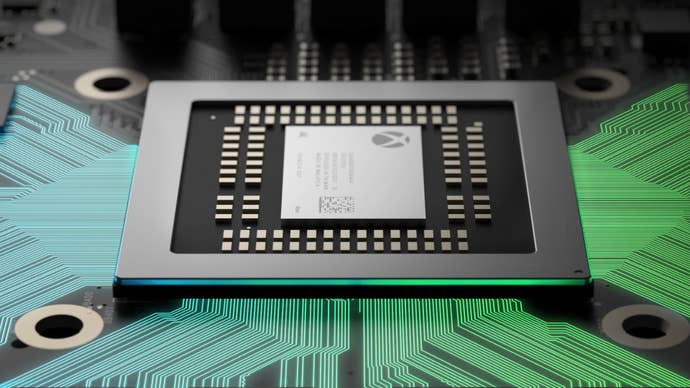Xbox Project Scorpio "Took Me By Surprise" Says Digital Foundry's Richard Leadbetter
We talk to Digital Foundry's Richard Leadbetter about his exclusive sneak peak at Project Scorpio.
This article first appeared on USgamer, a partner publication of VG247. Some content, such as this article, has been migrated to VG247 for posterity after USgamer's closure - but it has not been edited or further vetted by the VG247 team.
Nine months after its announcement at E3 2016, we finally have the final hardware specs for Project Scorpio, Microsoft's mid-generation upgrade to the Xbox One. Microsoft said it would deliver a beefy 4K gaming machine and the company went to work building exactly that.
Our colleagues over at Digital Foundry got an exclusive look at Project Scorpio's internals and the system running a demo of Microsoft's Forza Motorsport. While we weren't allowed to take a look at the system ourselves, we were allowed to ask Digital Foundry's Richard Leadbetter about his demo with Microsoft.
So without further ado, here's our inside look from the man who actually saw Project Scorpio.
USgamer: Was there anything that surprised you about Scorpio, or was it largely in line with your expectations?
Digital Foundry's Richard Leadbetter: The funny thing is that Microsoft knew exactly what my expectations were because I posted them in response to their E3 announce video last year. So with the GPU clock speeds in particular, they have delivered much, much higher frequencies than I expected - it took me by surprise and I think they got a kick off my reaction.
There's some extremely impressive customisation work at the silicon level elsewhere that will be massively beneficial to Scorpio, perhaps more in the longer term with DX12 engines, but based on the info they supplied and the motherboard render they showed last year, I'd say I got pretty close overall with the CPU and memory choices. At the end of the day, consoles will always be about bang for the buck, not the latest and greatest - but coding to the metal and first-party focus can obviously make up a lot of the difference.

USgamer: What did they let you play to show off the power of Scorpio?
Leadbetter: There was no gameplay, but the Forza Motorsport demo I saw hit 4K at 60fps effortlessly. What is interesting here is not just the 4K side of things but the fact that the demo took two days to port and just worked with tons of GPU overhead left over. Assuming these results apply to other developers too, the point is that they can spend the time working on new features and improved quality as opposed to sinking in weeks porting their engines across. The fact that I saw fully-functional, fully-performing software six to seven months out is a big deal.
USgamer: Rumors pointed to more memory, a switch to GDDR5, and a vastly improved memory bandwidth for the Scorpio. Does Microsoft deliver?
Leadbetter: We reported that ESRAM was gone in January, and that is indeed true. The E3 motherboard render explicitly showed a clamshell-like arrangement of 12 GDDR5 modules, meaning a 384-bit memory bus to deliver the bandwidth - and that's exactly what we get.
What is interesting is that the motherboard render they showed at E3 is actually fairly close to final hardware. That this was shown anything up to 17 months before release should highlight how long it takes to make a console and may better inform pre-reveal speculation on hardware spec.

USgamer: Have the hard drive speeds improved to fully utilize the memory?
Leadbetter: Right, loading times are a massive pain on many current-gen games and storage was a real concern of mine going into this. Scorpio has a faster hard drive with 50 percent more bandwidth in an attempt to at least make sure loading times aren't longer than they are now when dealing with 4K texture assets.
USgamer: With the PlayStation 4 Pro, developers have a number of ways to utilize the system's power, either through dynamic resolution, improved frame rates, and checkboard rendering. Do you believe the Xbox Scorpio will rely on this same random set of techniques, or does the system feel strong enough that we'll get native 4K across the board?
Leadbetter: Microsoft will be aiming for native 4K wherever they can, but they told me that if developers want to use checkerboarding instead and deploy GPU power elsewhere - or if they can't hit native 4K - there's nothing to stop them. The extent to which we'll see it on Scorpio remains to be seen as the dev kits are only just going out now. I've only seen one demo and as promising as that looked, we should bear in mind that the Forza engine is one of the fastest and best optimised in the business. I'm looking forward to E3 to see a wider range of content and crucially, some third party games.

USgamer: Did Microsoft address the fact that with the wide gulf in power between the Xbox One and Xbox Scorpio might hold back the more powerful system?
Leadbetter: I can't see this being an issue really as virtually all engines can scale upwards - even Microsoft's. So, to take Forza for example, there's a PC version with additional quality levels that the developer can tap into. That said, my hope is that we'll actually see more targeted use of resources - stuff that matters as opposed to slightly better shadows and full LOD geometry far in the distance you can't possibly see.
USgamer: Is there any indication that there will be an alternate mode for non-Scorpio titles, like PS4 Boost mode?
Leadbetter: Microsoft's really big on porting your existing Xbox library onto Scorpio and presumably beyond. They've pushed this in directions that are really going to play nicely with the enthusiasts. We've got a feature on Eurogamer about the enhancements you'll see. If you consider that Xbox 360 games run better on Xbox One, think of that as the beginning point for what they're planning with Scorpio.

USgamer: Any speculation on what this will cost with the specs you've seen?
Leadbetter: Well, it's going to be more expensive than Pro. That much is obvious. The physical size of the chip - pretty much the most expensive single component - is larger, meaning it costs more. The extra four gigs of RAM will add to the cost, as will the UHD Blu-ray drive. The hard drive is pricier, the cooling assembly too. I wasn't told anything about price, but reclaiming performance leadership in the console sector with the ambition Microsoft is showing isn't going to come for free.
USgamer: On a gut level, do you think the power of Scorpio enough to differentiate the system from the PS4 Pro? Or are we entering a region of diminishing returns?
Leadbetter: This is really impossible to tell because there are no comparison points where it matters: software. On a pure specs level, Scorpio beats Pro in all areas but what Sony has shown is that its hardware can punch well above its weight. You look at Horizon Zero Dawn or Ratchet and Clank and these are awesome 4K games, regardless of the technical sleight of hand going on in the background. That said, in multi-plats, that extra four gigs of RAM in Scorpio ensures we get higher quality textures wherever they are available - and a lot of games do support that now.










